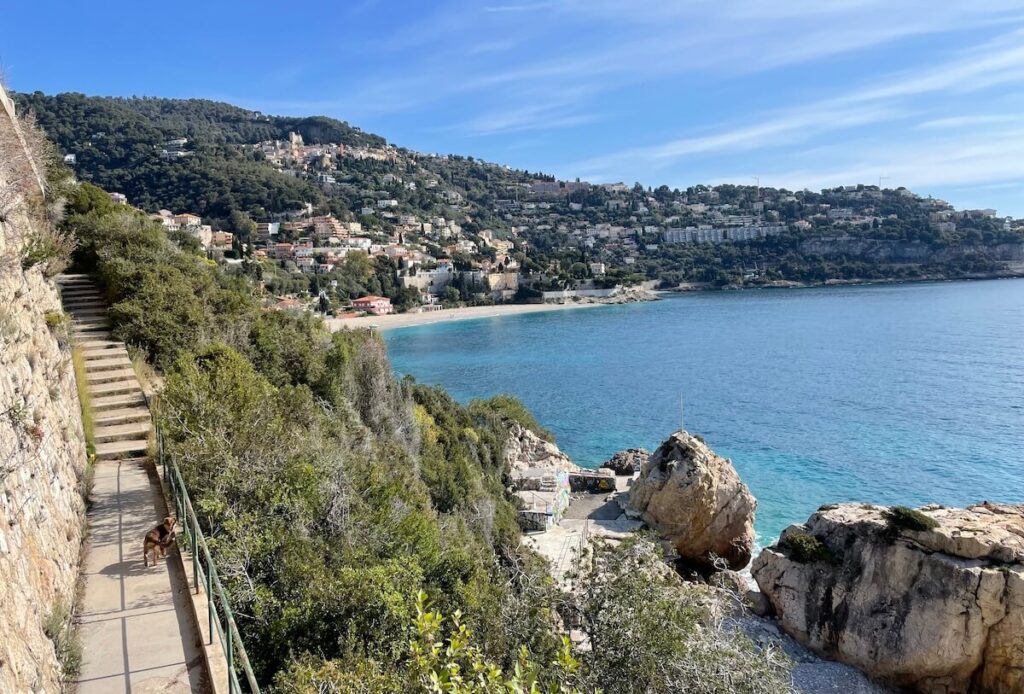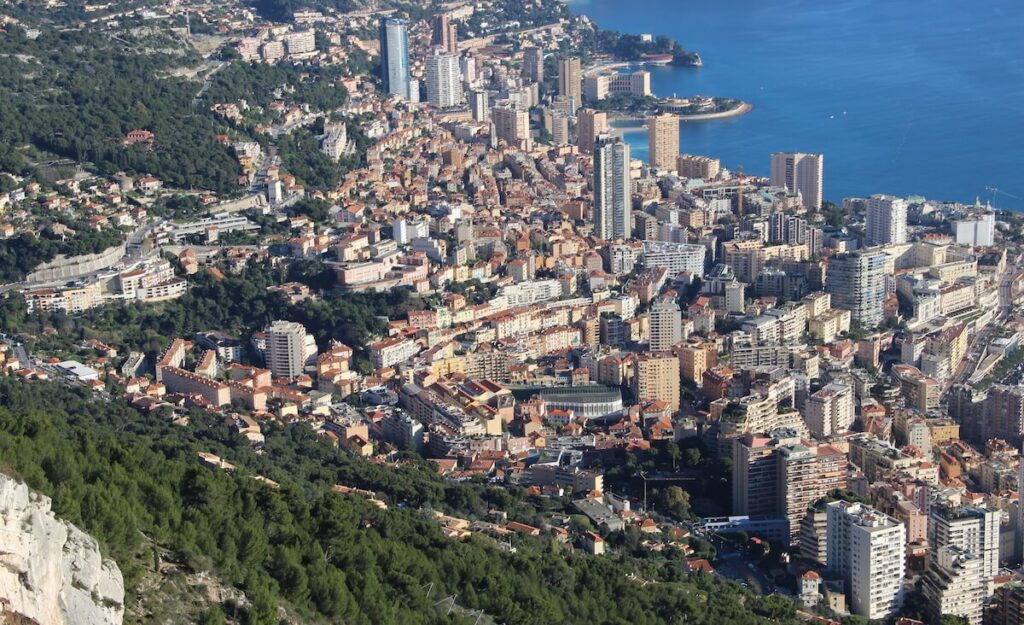“I’ve never seen anything like it in my 10-year career”: major property crisis affecting neighbouring towns

The Fédération Nationale de l’Immobilier (FNAIM – French National Real Estate Federation) is sounding the alarm.
“The housing crisis has become a reality.” In its 2023 activity report, published mid-January, the FNAIM warns of a collapse in the number of property transactions across France: 875,000 – 240,000 fewer than in 2022. This is the sharpest fall in 50 years, as the national media have pointed out. The Côte d’Azur, and more specifically Monaco’s neighbouring towns, are no exception.
“That’s correct,” says Audrey Fenocchio, sales representative with the Aime Immo estate agency in La Turbie. “There has been a real slowdown since summer 2023. It’s very quiet, with very few properties for sale.” Stéphane Gastaldy, founder and director of Century 21 Agence Gastaldy in Cap d’Ail, agrees, describing “a sudden standstill in the property market.”
A standstill in terms of the number of properties put up for sale as well as the number of buyers.
Interest rates to blame
Of course, inflation and the sharp rise in interest rates are the main reasons why buyers have disappeared. Or rather, a certain category of buyers: “Yes, we still receive purchase enquiries, but these are often from people who already have assets,” explains Audrey Fenocchio. “We sell mainly to foreigners, people who don’t need credit. Customers from the middle class down are nowhere to be seen.”
“When you lose 20% of your purchasing power, you put off or change your plans,” says Saïdou Bacar, owner of the Laforêt agency in Beausoleil. “Someone with a million euros at the end of 2022 would only have had 800,000 euros in 2023.”

When you lose 20% of your purchasing power, you put off or change your plans
Saïdou Bacar, Laforêt Beausoleil agency
“In 2023, the number of people buying main residences fell by between 20% and 40%,” explains Stéphane Gastaldy. “Either these customers can still finance their project, but will have to pay more in monthly instalments, or they buy fewer square metres to compensate for the loss of purchasing power, or they postpone their project altogether, which is what usually happens if there is no immediate rush, such as a baby arriving. (…) The only market that remains buoyant for the time being, unlike in other French regions, is second homes. We’re talking about a foreign clientele that doesn’t need credit and is still looking for property. These customers are not impacted by what is happening in France.”
A foreign clientele that is sometimes based in Monaco. Cyril Hennion, co-founder of the Azur’Estate agency in Roquebrune-Cap-Martin, comments: “We’re coping, because we still have Monegasque residents buying in Roquebrune. It’s an advantage we have over towns that are farther away. Buyers don’t need credit to buy.”
Saïdou Bacar does not share that analysis. Unlike Cap d’Ail and Roquebrune, which are by the sea, Beausoleil is of little interest to second-home buyers: “They’re not our core target. Beausoleil is a town where people live and commute from.”
Prices still very high on the Côte d’Azur
It is precisely this proximity to the Principality that explains why prices have not fallen, unlike in many French towns and cities in France. A trend confirmed by the Observatoire Guy Hoquet’s annual report for 2023.
“Sellers won’t budge on the high prices they are looking for,” explains Stéphane Gastaldy. “Since the second-home market remains very buoyant and dynamic, with buyers who have strong purchasing power and are still buying at high prices, property owners do not want to lower their prices. They expect us to find them wealthy customers who will buy their property as a second home. But these customers are few and far between; they are a niche clientele, domiciled abroad. Sellers are sticking to a price that is too high, at a time when there are very few buyers. Plus they have suffered a huge drop in purchasing power with interest rates doubling or even tripling over the last two and a half years. Today’s borrowing rates are 4.5 – 5%.”

Audrey Fenocchio thinks lower prices could be a solution: “Prices haven’t dropped in the area, but that’s what I’d like to see to restore some balance to the market. The prices owners are asking for are totally unjustified! But being so close to Monaco…”
The prices owners are asking for are totally unjustified
Audrey Fenocchio, Aime Immo La Turbie
Not only are prices still very high, but there are also fewer sellers. “The rise in mortgage rates isn’t helping matters,” she points out. “These days, people don’t sell unless there’s a change in their family situation, such as a divorce or a birth. I’ve been an estate agent for ten years and I’ve never seen anything like it.”
“Sellers have seen the rise in borrowing rates,” adds Saïdou Bacar. “And realised that their property’s value was likely to drop. Some have therefore put their plans to sell on hold.” “People used to sell to buy a slightly more expensive property,” confirms Cyril Hennion. “They could borrow more from their bank. But this year, everything’s frozen and so it’s complicated to conclude transactions. As a result, prices are stagnating. They’re not going up, but they’re not coming down either.”
A “completely depressed” rental market
All of this has a major impact on the rental market. What could be seen as a boon for estate agents is in fact a real issue for potential tenants. “It’s difficult for the customers because there are very few properties for rent in La Turbie and a huge demand,” says Audrey Fenocchio. Demand that comes mostly from the Principality’s many employees, who are looking for accommodation close to their workplace.
“We have very few rental properties,” agrees Cyril Hennion. “As soon as we publish an ad for a property to let, it goes very quickly.”
The situation is even more fraught in Beausoleil, a commuter town for the most part. “Rents in Beausoleil are higher than elsewhere,” says Saïdou Bacar. “With rising interest rates and tougher borrowing conditions, especially for first-time buyers, some people who wanted to own their own home have ended up renting, so the market is even more saturated. And investors also stopped buying in 2023 because of lending rules. It’s a vicious circle.”

“The rental market is even more depressed than the sales market,” says Stéphane Gastaldy. “Plus we’re seeing a shutdown on new developments, as investors turn away from property. (…) Previously, first-time buyers would buy a property to live in, freeing up a rented property. That’s not happening now. People stay put because they know they won’t be able to buy. Everything is grinding to a halt, it’s a nightmare. Supply is down to a trickle. We don’t even publish the properties that we get any more, because we are inundated with calls.” He believes that this shortfall in the rental market is not only explained by the current economic climate, but also by political choices.
Holiday lets fall through the energy cracks
“This is the most serious thing to my mind,” he says. “It’s awful and it’s clearly the politicians’ fault. The real estate bodies warned them, but the politicians carried on with their strategy, which makes no sense. Landlords who rent to the local clientele have more and more constraints, with the timetable for the Diagnostic de Performance Energétique (DPE – Energy Performance Assessment) and heavy, sometimes very, very heavy taxation. There was also a political decision to completely deregulate holiday lettings, with platforms like Airbnb. And there are no restrictions for these: if you want to rent a poorly insulated or even dangerous property (for example, with substandard electrical wiring), you can. So the owners go for short-term rentals, aimed at tourists, because we are a tourist destination. This means all these properties are being taken out of the long-term rental market, and local workers aren’t able to find a place to live. If we want a proper housing policy, we have to preserve the right to housing and put all the properties on an equal footing. If a property is unsafe, it’s unsafe, and if it’s not energy-efficient, it’s a complete nonsense to be able to rent it out short-term and not long-term. And that’s all politics. We need legislation.”
The real estate bodies warned them, but the politicians carried on with their strategy, which makes no sense.
Stéphane Gastaldy, Century 21 Cap d’Ail
Beausoleil, where the housing stock is now ageing, has the same issue. “The DPE ratings for properties don’t tend to be A or B,” says Saïdou Bacar. “This creates fears among investors, who prefer to let their properties on a seasonal basis, because there aren’t all these constraints and because returns are higher. But we are still confident on the sales front, despite everything. When the ‘Climate and Resilience’ Act comes into force in 2025, G-rated homes will no longer be able to be rented out. Renovation work will inevitably be carried out, or else the owners will sell to people who will carry out the work themselves, so there will be a natural turnover of the rental stock.”
Could the law provide an opportunity for future buyers? “Yes and no,” answers Saïdou. “Yes, because the cost of energy efficiency improvements will be factored into the estimate and the sale price. And no, because right now banks look at the DPEs and when they see properties with a very low energy performance rating, they refuse the mortgage or make the borrower take out a home improvement loan.”
A gradual recovery in 2024?
Stéphane Gastaldy also wants to stay optimistic: “I think we’ll see stable prices in 2024, which I hope will enable us to kick start a positive dynamic, with sellers willing to settle for a lower sale price than they had hoped for. (…) The only glimmer of hope at the moment is that lending rates have been stable for a few days now, and some banks are even cutting rates. And let’s not forget that loan rates can be renegotiated, as stated in the loan agreements and by law. But it’s difficult for customers to understand this, and most prefer to wait. (…) Alpes-Maritimes is still relatively well-protected: some towns in France have seen sales going through with prices dropping by more than 15%. Some estate agents are closing branches, even in Paris. And with fewer sales, some local authorities are collecting less tax, which means balancing their budgets can be an issue. It’s a genuine housing crisis, and it’s scary. I’m an optimist by nature, and I think I’ll be able to stay afloat, but what is frustrating is that there is nothing we can do about a lot of it, especially the political side.”
We’re not expecting a bumper year in 2024
Cyril Hennion, Azur’Estate Roquebrune-Cap-Martin
Saïdou Bacar also hopes to see a gradual recovery this year: “things should be much improved in the second half of 2024. Some banks have already started to drop their rates. And demand has increased compared to the end of 2023.”
Audrey Fenocchio and Cyril Hennion, however, remain cautious. “The phone hasn’t rung for months,” says Audrey. “I’m not at all confident about 2024. I’m counting more on major sales than on a large volume of them. I’ve been keeping an eye on my finances for a while now. I saw the rates going up and realised there was going to be trouble. So, for the time being, caution is the byword for 2024.” “Rates fell a little at the start of the year, but we’re not expecting a bumper year like two or three years ago either,” adds Cyril. “We hope there will be an improvement in 2025, but it is too early to say.”











